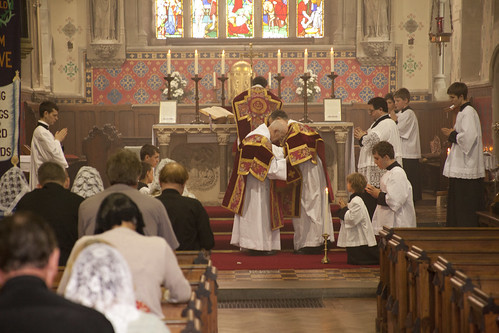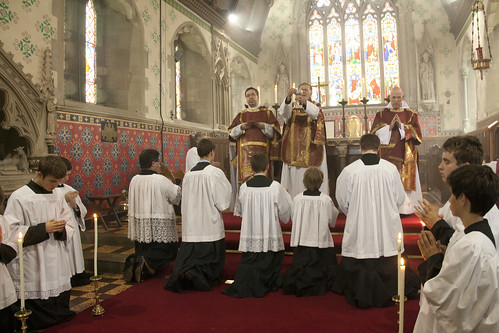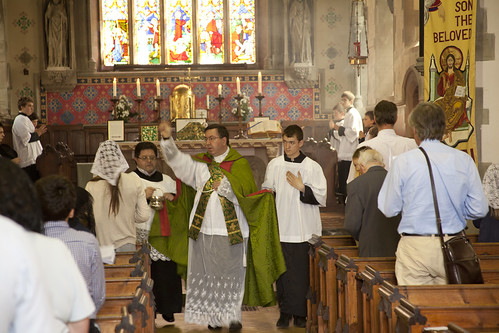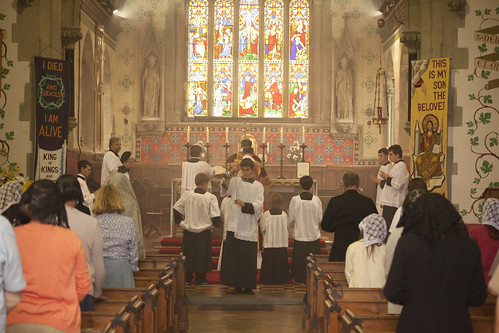 |
| You can't hear what they are saying, but you can see what they mean. |
'Joseph Shaw (Letters, August 23) provides something of a conundrum. On the one hand he knows what other people can't possibly know, such that "liturgical meddlers have done incalculable damage to the spiritual lives of Catholics", and yet, as chairman of the Latin Mass Society, he says we must "allow the liturgy to speak to us" and "be sensitive to its symbolism" and "nuances."
 |
| A dramatic presentation of Something very special |
Pope Benedict, Letter to Bishops accompanying the Motu Proprio Summorum Pontificum: 'I have seen how arbitrary deformations of the liturgy caused deep pain to individuals totally rooted in the faith of the Church.'
But back to Mr Whitehead.
But speaking as an "ordinary Catholic", for us to be sensitive to any text, and if that text is to have any "nuances" for us, we must first be able to understand it. Yet I know (with the same degree of perception as Dr Shaw) that at least 99 per cent of English congregations today do not understant Latin. Indeed, in the actual days of the Latin Mass, I was an altar boy and could recite every response both without difficulty and without understanding a word. For me, it had nothing recognisable as a "nuance" and there neither did it "speak" to me, nor have any "symbolism."
Mr Whitehead has forgotten that the liturgy is not just a text. Can you not see the symbolism of, say, the priest washing his hands at the Lavabo, without hearing the text he is reciting, in English? It is a problem if not: the text is to be said silently even in the Ordinary Form. Silly old Paul VI and Bugnini: wrong again!
... So unless Dr Shaw has devised a means of mass (sic) teaching of Latin to almost the whole of English-speaking Catholic congregations, his impressive-sounding references to "nuance", the "liturgy speaking to us" and to its "symbolism", members of the Latin Mass Society would be better to resign and form an English Mass Society, ...to eradicate just the latest work of "meddlers", eg "sending your Holy Spirit on them like the dewfall" (which belongs to and should have been left in the Old Testament), because for 99 per cent of Catholics the previous version was fine, did speak and did have nuance and symbolism.
Yours sincerely,
AK Whitehead, Pontefract, Yorkshire.
Yours sincerely,
AK Whitehead, Pontefract, Yorkshire.
Now it is the Holy Ghost who is under attack, for using obscure imagery in Sacred Scripture. He should have known better: 99% of people are unmoved by poetry and don't know what 'dewfall' is anyway. Or so Mr Whitehead appears to think.
This is one of those letters which seems to teeter on the brink of coherence. One has to be selective, in any case, in choosing what points to respond to; I wrote, and have been published this weekend, as follows.
 |
| The Lavabo: another silent symbol. |
But there is more to engaging with the Latin liturgy than looking at a translation. Bl John Paul II wrote (Dominicae Caenae 1980, 10), speaking of those educated in this liturgy, that ‘through its dignified character [it] elicited a profound sense of the Eucharistic Mystery.’ The fact that it is in a beautiful, ancient, and universal liturgical language, and not our cradle tongue, communicates something to us which, as the late Holy Father worried, is difficult to communicate in any other way.
In a recent survey in America, the respected Centre for Applied Research in the Apostolate found that not only do only half of self-identified Catholics believe in the Real Presence, 37% were not aware that this was the teaching of the Church. They attend Mass in their native language: do they understand it? It seems not.
 |
| The Asperges on Sunday: a poetic image, of sprinkling and washing, acted out. |


Salve Doctor!
ReplyDeleteIt would be best to refrain from writing all that I would like to about Mr Whitehead's letter, which certainly conveys his ability to miss the point spectacularly.
Instead I refer to something I read this week, which is both poignant and noteworthy. Seamus Heaney, as famous a poet in these days as you can get, the material for whose craft was a direct and clear English, died, as we all know by now.
His last words were in, of all things, a text message to his wife minutes before he died. It was in Latin. Noli timere - do not be afraid. Is Latin dead? Hardly. There is an essay in this poignant act which I hope someone will write, as it is beyond my skill. Otherwise Mr Whitehead will miss the point yet again.
Pax.
I hope Mr. Whitehead will one day realise the favour he has done proponents of the old mass (and therefore what a favour he is doing for Our Lord, who, I think, wants us to attend the old mass...) through putting into print what so many have come to accept, though, deep down, they know it to be wrong.
ReplyDeleteI often argue with my parents about the new mass vs. the old mass but my Mum read your letter, Dr. Shaw, and she heartily agrees with you! She even made a point of telling me about it before I had read it on your blog! Slowly but surely people like my Mum, who was raised with the old rite, will come back to it and devote themselves to it because people like Mr. Whitehead so clearly demonstrate why doing otherwise lead one's to champion silly ideas (and worse!) such as the idea that the Holy Spirit dwelling on the offerings is an idea that belongs only in the Old Testament!
Thank you!
DeleteI have pondered for a long time this question of the vernacular in the Mass. I know more than one very conservative Catholic who, after being exposed to the TLM, multiple times, confesses an admiration for its reverence, mystery and power, and yet still finds the Latin to be a barrier. I make the arguments about the latreutic dimensions of the Mass, that it is not a didactic exercise, the fact that most Catholics really weren't even paying attention with the dumbed down 1973 ICEL translation...they only go so far, alas.
ReplyDeleteOf course, if it were really only about the Latin, or comprehensibility...I think most here would agree with me that, important as Latin is, (for the excellent reasons Dr. Shaw gives above, and has given on other occasions), it was the LEAST thing that was changed beginning in 1964-65. The reformers had far bigger fish to fry, and fry them they did. After all: The Church, East and West, has multiple languages in its ancient rites; Latin remains the language of the Roman Rite (and its derived rites and uses), but there is nothing...dogmatic about its 100% retention.
Having had the opportunity to worship and serve now at a very "high church" Ordinariate parish, where the Anglican Use is celebrated as something very close to the old English Missal - which is to say, almost the TLM in hieratic English - I have wondered whether this could not be a proving ground for a truly traditional restoration of the Roman Rite that incorporated significant degrees of the vernacular, particularly in the variable parts of the Mass (collects, propers, readings). (I don't say I approve of everything in the Anglican Use, especially not the retrention of the 3 year lectionary, but overall direction and structure of the AU Mass, being so much closer to the old Roman Rite as it is, or can be) Of course, even *this* would be fought to the death by certain elements in the Church, who would realize that far more is at stake than language. But it is something to think about.
Athelstane: thanks for the comment. I do howev think that the use of a liturgical language, in the West Latin, is very important. See the Position Papers on Latin as a Liturgical Language and on the Proclamation of the Lections in Latin.
ReplyDeleteI think that switching between Latin and English doesn't work: it fails to create the sense of a sacred time and space in which we are worshipping God and not talking to each other.
Hello Dr. Shaw,
DeleteI don't really disagree with you, or with the reasoning you gave in the FIUV paper. In particular, the universality of Latin, as it once existed, is not to be taken lightly. This is brought home to me every time I attend a TLM on the Continent, and find myself immediately at home, missal at the ready - or, conversely, witness the shock of a multi-cultural parish, switching immediately from one Mass in English to another in Spanish, or Vietnamese herein the States. It is Balkanization by any other name.
All I meant to say is that we need to think harder about how to address the obstacle that Latin seems to have become for some, even among those otherwise sympathetic to the Traditional Rome Rite. TLM's will continue to grow steadily, in both Europe and North America especially; but my concern is that there's likely a ceiling for it, or at least one that's difficult to break through, in which it still remains a small minority of Masses, even with all the clerical and episcopal good will in the world. One wishes that Church institutions took education in Latin seriously once more...
And to this end, I occasionally engage in a kind of mental exercise: What if all that were done in 1963 were to take objections about comprehensibility at face value, and the option had been offered to celebrate much of the 1962 Missal in a very hieratic vernacular, with no other modifications permitted? Hieratic can, to a (diminished) degree, preserve *some* of the sense of a sacred time and place. But I concede that I usually indulge in the exercise as a way to call the bluff of most progressives, who deeply desire(d) far wider ranging reforms to the Roman Rite...
This comment has been removed by the author.
ReplyDeleteThis comment has been removed by the author.
ReplyDeleteThis comment has been removed by the author.
DeleteDr Shaw your patience is admirable Mr Whitehead is I am sorry to say, in Scottish vernacular a richt 'dunnderheid' and almost unworthy of your eloquent response and sad to say a classic example of the type of Roman Catholics the post conciliar church has produced. Mr Patrick Gray for one so young your comments carry the wisdom of age and give me immense hope for the future in the bleak present we inhabit. Hope to meet you one day in Edinburgh when attending Mass at St Andrews where we are blessed in having Father Emmerson.
ReplyDeleteHaving the Mass in one's own language is a blockage to understanding. I normally hear Mass in Swedish and that is probably an advantage for me, though not for the natives in the benches beside me. That said, the exercise is pointless because people don't speak or read properly, the sound systems and acoustics of the churches blur the sound and at least 60% of the congregation consists of immigrants so Mass might as well be in Latin - then we would not have to struggle with the priests' often heavily accented Swedish.
ReplyDeleteMore to the point, the real reason why the vernacular is an obstacle to understanding has a scientific explanation here.
I am only sixteen; I have some Latin and, as a disclaimer, I do, although reluctantly, assist at the Novus Ordo. All of these make me unsuitable to comment but I will try.
ReplyDeleteAs Dr. Shaw points out, vernacular translations of the Mass are very widely available - bound in the covers of our Missals. I own one myself. I think it extremely unlikely one could go to Mass and not pick a little up. However, it is actually irrelevant whether one understands the Latin or not. An uneducated Irish peasant or a poorly educated Liverpool dockman heard his Mass in the 1950s with reverence, devotion and piety, I am sure. He went to Confession - which our Modernists do not - and he knew perfectly well what the Mass is, not the communion meal beloved of Monsignor Loftus and his ilk, nor the faintly Gnostic waffle about the 'Paschal Mystery', but the divine Sacrifice of the Immaculate Victim to God by the hands of His Priest.
Perhaps Mr. Whitehead's memory fails him, but much of the Tridentine Roman Mass is silent - as Mr. Evelyn Waugh said (a man whom, on the Church and the state of the 'Age of the Welfare State', I am in perfect agreement) 'participation', ''the cant word, does not mean making a row as the Germans suppose. One participates in a work of art by regarding it with love and understanding''.
I deplore and despise the conciliar Church. Basil Hume and Derek Worlock - good grief! dozens of others, in Scotland, Tartaglia, Conry, O'Connor - what a crew 'new men'! preside over the destruction of the Church with Butlins-style Masses and grinning banality. I find it harder and harder to maintain the respect of hierarchy and any real connection between them and; say, Cardinal Bourne or Manning or Challoner] - both the destruction of the Mass and the other, far more disturbing changes of Faith and Morals which enrage, distress and disturb me. How can I say that, having not even been born at the time of the Council? Well, my parish priest was an old Benedictine who was at the Anselmian in Rome in the '50s (he got into terrible hot water, God bless him, for saying the Tridentine Roman Mass well into the 1970s) and we had Sung Benediction in Latin in the old books, there is nothing so beautiful in the world, 'O Salutaris', 'Tantum Ergo', the candles blazing and the smell of the wax and incense; and will assist at the Tridentine Mass whenever I am in the Central Belt [of Scotland].
So church-going is a terrible trial, especially as the better sort of Novus Ordo has been replaced with the worst of the Novus Ordo. I don't mean to use your blog as an agony aunt, Dr. Shaw and I ought to write to Mgr. Boyle at Una Voce Scotland to see if there should be a Mass in the Highlands rather than complaining. 'The b-------- up of the Church is a great sorrow to me.'
Of course, if Mr. Whitehead defends the miserable, Butlins-cum-Karl Rahner 'Eucharistic assembly' concocted by Bugnini and his Consilium in the 1960s, with its infantilism, its inept mid-Atlantic English, its banality and its doctrinal dubiety (I think it was Hugh Ross Williamson who said that), then I pity him.